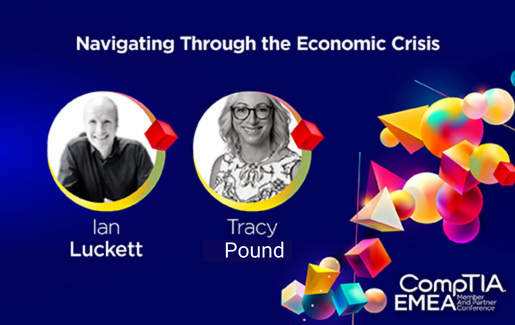
Between increases in interest rates, energy prices and inflation across the globe, no MSP is exempt from the effects of economic crisis. However, amongst all the challenges lie many opportunities for MSPs. “We’re facing some really big issues, not just in the UK but worldwide,” said Tracy Pound, managing director at MaximITy and an executive council member of CompTIA's UK & Ireland Community. “But in all instances, there’s always an opportunity, and sometimes it’s looking at things from a slightly different perspective.”
During a session at the EMEA Member and Partner Conference 2022, Pound and Ian Luckett, co-founder of The MSP Growth Hub, got candid about the struggles that MSPs face in today’s world and how to stay future focused when times get tough. Here’s what they had to say:
Three Principles of Great Leadership
Leadership and culture often go hand in hand. Understanding how to leverage your leadership capabilities and scale your confidence can be a big differentiator. Moving from being a great tech leader to a great business leader is important, especially if you are looking to survive and even grow in times of economic hardship. To help MSPs understand what great leadership might look like within their companies, Luckett detailed three principles.
1. Personal Leadership
“As a business owner what is your personal goal? What does winning look like to you? Do you want to become a great person within your organization? If you own an MSP, what do you want it to look like in the future?” said Luckett. “Personal leadership is all about where you want to go as an individual."
2. Strategic Leadership
This is the vision and the value of your business. “You’re never going to build a house, go on holiday, or fly a plane without a plan, and you need to know where your business is going, particularly over the next couple of years. As a leader you need to know what you want to achieve,” said Luckett.
3. Team Leadership
Creating a successful business relies on building, engaging and leading a great team. “People overtime overlook team leadership, particularly as the business is growing and developing,” said Luckett. “You’ve started off on your own, you’ve then got a couple of techs and you’ve got a very flat structure, but then you’ve started to scale and grow, and everyone is doing different jobs. How’s that going to scale?” The bottom line is, you can’t let the day-to-day work of running a business overtake the important work that you need to do within your team.
Understanding Your Cash Flow
Taking time outside of your business is critical to be able to focus on what you want to achieve and what is going on within your company. “I know a lot of MSPs who are very successful, but they don’t necessarily know where that success is coming from, they don’t know why they’re making the money they’re making,” said Pound.
Staying on top of your financials and the health of your business is critical to grow and scale. "Some of it is taking away the stigma from saying hey I don’t understand my finances,” said Pound. Admitting that you don’t fully understand your finances can be difficult but will help set you up for future success.
“A lot of people don’t know where to start with it, but it doesn’t need to be something you lock away in the cupboard and never deal with,” said Luckett. Bringing your struggles to light will make it easier to find solutions.
Customer Experience Pervades Your Entire Company
It is important for business owners to have open and honest conversations both with clients and employees. Know where your pain points are, plan to address them, optimize your workflow and involve your whole team in the process. Anyone who has a touchpoint with your customers affects customer experience. It goes all throughout your organization and shouldn’t fall strictly on your account managers, according to Pound.
“Everybody says ‘We need to give a good customer experience,’ but what does that actually mean? The reason it’s so important is because in the current economic environment, there's a good chance that our customers are going to go shop for other [companies] to work with,” she said. “They might want to see where they can reduce costs, reduce overheads, and they might be struggling in their own right. We need to know about that. And the only way you’ll know about that is if you have a good relationship with your clients.” If you are keeping your finger on the pulse, losing a client should never be a surprise.
Addressing Mental Wellbeing in the Workplace
Remember to take some time to slow down, take care of yourself, and be compassionate yet firm with both employees and clients. “Be sensitive to somebody’s home environment and their personal world because if you show them compassion and it’s a part of your culture, then you get a lot more back from it,” said Pound.
When someone isn’t performing, approach the situation first with compassion: check in with them instead of making assumptions as to why they aren’t meeting performance goals. “Develop a culture that is pervasive through the whole organization where people know that they’re cared for, that they matter, that they have a place in the world,” she said. People are going to struggle because of rising costs, and their home environments will affect their work. Take this opportunity to build rapport with those you work with, compassion and mindfulness are key components of your future success.
From Ideation to Reality
Imagining what the future of your business may look like is one thing but unless you take time to work outside of the business, nothing will change. “Sometimes it's about giving yourself the space to stop and think and do something differently,” said Pound. “We’ve all got so much stuff that we could probably work the better part of 24 hours a day every day of the week, but there is still time to create breathing space. Give yourself the gift of the time out of your business.”
Taking this time is a big commitment, since it is not actually cash-generating work, but it will give you a forward strategy so that everyone in the business is working on moving the business forward.

 Add CompTIA to your favorite RSS reader
Add CompTIA to your favorite RSS reader

